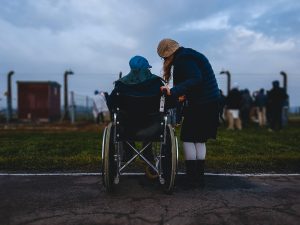14 Dec Can entrepreneurial upskilling help fix the unemployment crisis facing disabled people
Accurate global data for the employment situation facing disabled people is difficult to co-ordinate. But we do have access to enough data to confidently say that there is a very real unemployment crisis facing those who live with disabilities. And this, of course, has been exacerbated by the pandemic. Before I talk about the benefits of entrepreneurialism for disabled workers, I want to relay some statistics to show how widespread this problem is. There is not enough being done for the disabled community, and there is plenty of evidence to show that they are suffering from more job losses than other communities thanks to COVID-19. This has to change – can entrepreneurial skills help on this?
The unemployment crisis facing disabled people around the world
According to the UN, the unemployment rate for people living with disabilities is at least twice that of other people. In developing countries, up to 90% of disabled people are unemployed. In industrialised nations, the percentage of unemployed disabled people is between 50% and 70%.
This was the rough situation before the pandemic. If we turn to figures from the New Hampshire University Institute on Disability in the US, we find that around one million US workers living with disabilities have lost their jobs since the outbreak was proclaimed a pandemic in March 2020.
There is no doubt that disabled workers have been affected by the pandemic in a disproportionate way. The US Bureau of Labor Statistics confirms that 20% of disabled workers have been dismissed from their jobs since March, compared with just over 14% from the general population.
Over in the UK, there are approximately 14.1 million disabled people, with 19% of working aged adults living with some form of disability. And according to the Labour Force Survey covering April to June 2020, just over four million disabled people are employed. In addition, the survey shows that disabled people are more than twice as likely to be unemployed than the rest of the population. Add in job losses due to the pandemic and the crisis is clear.
More disabled workers furloughed or laid off during the pandemic
During the pandemic’s first wave, millions of employees around the world were either furloughed or laid off. And according to some experts, people with disabilities were often last in and first out. Additionally, the biggest mass redundancies and job losses have been in the retail and hospitality sectors.
These are the same sectors in which many disabled people had managed to find jobs pre-pandemic. During lockdown in every country, essential workers continued to manage stores, distribution centres and health care centres. But again, many disabled people were left behind due to underlying conditions that means they’re high-risk for COVID-19.
It’s possible that employers have been reluctant to hire people with disabilities during the pandemic because they assume that any specific reasonable accommodations needed would be expensive. We can’t forget that the pandemic has decimated so many businesses, and in these kinds of crises, it’s often the disabled community that suffers most.
In the US, according the president of the National Council on Disability (NCD) Neil Romano, people with disabilities often face obstacles when they search for work. Obstacles that just aren’t there for the rest of the population. These include archaic federal training programmes that funnel disabled people into industries that are already most replaced by automation. Other barriers to employment include a negative workplace culture, manager opposition to hiring disabled people, overlooking anyone with disabilities when they apply and sometimes illegal discrimination.
People with visible disabilities could be omitted as the employer may assume they’re simply less capable. Brooke Ehrlich, an attorney in Fort Lauderdale, says that research proves that implicit bias can and does affect even the most progressive employers and businesses.
Disability does not impede skills and ability
I live with a disability and I know first-hand that it does not mean inability. And it doesn’t mean you can’t achieve in the workplace (or outside of it!). Gaining entrepreneurial skills and learning how to start a business is a viable and extremely possible way out of this trap for people who live with disabilities.
Yes, we want employers to change, but while we wait for systemic problems to be resolved and ingrained attitudes to change, taking control is also an option. Self-employed entrepreneurs in the UK make up 18% of its total disabled workforce, compared with 14% among non-disabled workers.
In the US, disabled people make up the biggest minority group in the country. And, just as in the UK, more and more people with disabilities are taking the leap into entrepreneurism.
Here’s why entrepreneurialism can help – entrepreneurial skills
According to the (NCD), there are up to 57 million disabled people in the US. Pre-pandemic in 2019, only 19.3% of these were employed. And there are plenty of disabled activists who are living proof that dynamic entrepreneurism is well within their grasp. Academically brilliant, Ric Nelson graduated within the top 10% of his high school and got a scholarship to study an associate’s degree and a bachelor’s in Small Business Management and Business Administration.
Today Ric is 37 and lives in Anchorage, Alaska, where he’s the Employment Program Coordinator for the Alaska Governor’s Council on Disabilities and Special Education (GCDSE). And because Ric achieved all of this despite his severe cerebral palsy, he constantly works to improve access to education and work for disabled people.
Another example is Christopher Casson, an award-winning event and commercial photographer who is on the autism spectrum. He uses his exceptional level of focus to actively help other entrepreneurs and employees lobby for their needs. Two years ago, Christopher launched the Autism to ARTism movement. This aims to eliminate the barriers adults with autism face.
And when his new business was stopped in its tracks by COVID-19 in March 2020, Christopher continued to show the resilience of a successful entrepreneur. By pivoting from events and wedding photography to real estate photography, he has found a way to make it work.
In any crisis, and with any person disabled or not, entrepreneurial skills are vital. We’ve seen small businesses pivot in so many ways during the pandemic and now we are witnessing more and more entrepreneurs from the disabled community. By learning project and budget management, basic business entrepreneurial skills, marketing and more, people with disabilities can showcase their skills and get back into the workplace – on their own terms.
There are grants available in many countries around the world to help disabled people get the training they need so they can prove their worth to the workplace. They shouldn’t have to, but in a world that is slow to change its attitudes, entrepreneurism offers that window of opportunity for anyone and everyone.

Rouzbeh Pirouz is Co-Founder and Senior Partner at London-based Pelican Partners, a real estate and private equity investment firm. On this website you can find out more about his life, work and experience.






